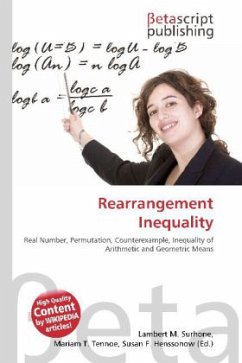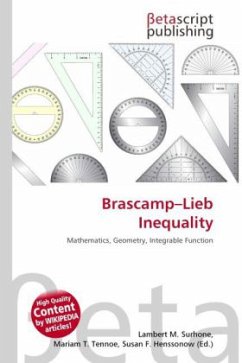
Rearrangement Inequality
Versandkostenfrei!
Versandfertig in 6-10 Tagen
23,99 €
inkl. MwSt.

PAYBACK Punkte
12 °P sammeln!
Please note that the content of this book primarily consists of articles available from Wikipedia or other free sources online. In mathematics, the rearrangement inequality states that x_ny_1 + cdots + x_1y_n le x_{sigma (1)}y_1 + cdots + x_{sigma (n)}y_n le x_1y_1 + cdots + x_ny_n for every choice of real numbers x_1lecdotsle x_nquadtext{and}quad y_1lecdotsle y_n, and every permutation x_{sigma(1)},dots, x_{sigma(n)} of x1, . . ., xn. If the numbers are different, meaning that, x_1cdotsx_nquadtext{and}quad y_1cdotsy_n, then the lower bound is attained only for the permutation which reverses t...
Please note that the content of this book primarily consists of articles available from Wikipedia or other free sources online. In mathematics, the rearrangement inequality states that x_ny_1 + cdots + x_1y_n le x_{sigma (1)}y_1 + cdots + x_{sigma (n)}y_n le x_1y_1 + cdots + x_ny_n for every choice of real numbers x_1lecdotsle x_nquadtext{and}quad y_1lecdotsle y_n, and every permutation x_{sigma(1)},dots, x_{sigma(n)} of x1, . . ., xn. If the numbers are different, meaning that, x_1cdotsx_nquadtext{and}quad y_1cdotsy_n, then the lower bound is attained only for the permutation which reverses the order, i.e. (i) = n i + 1 for all i = 1, ..., n, and the upper bound is attained only for the identity, i.e. (i) = i for all i = 1, ..., n.












